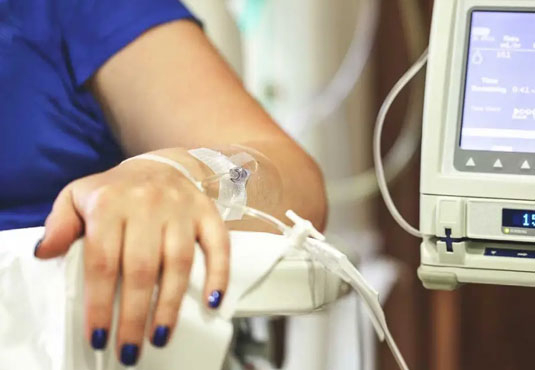
Chemotherapy is a treatment method in which one or more drugs are used together with the aim of destroying cancer cells.
In breast cancer, chemotherapy is a commonly used treatment option. The goal here is to kill cancer cells or control the growth of cancerous tissue. Chemotherapy primarily targets rapidly growing and dividing cells, such as cancer cells, with the aim of eliminating them.
The use of chemotherapy in breast cancer is planned based on the size and stage of the tumor. After determining the hormone receptor status in cancerous tissue, if it is found to be hormone receptor-sensitive, hormone therapy may be administered. In this case, chemotherapy may or may not be preferred. Chemotherapy can be planned based on lymph node involvement.
Chemotherapy is chosen as a treatment for breast cancer patients either before surgery (neoadjuvant) or after surgery (adjuvant). The goal of chemotherapy administered before surgery (neoadjuvant) is to shrink the tumor, making the surgery easier and serving as a method to identify the effective drug. Post-surgery chemotherapy (adjuvant) is chosen to reduce the risk of cancer recurrence.
Chemotherapy is a treatment method with associated side effects. Commonly observed side effects include hair loss, nausea, decreased blood counts, vomiting, loss of appetite, weakened immune system, fatigue, and weakness. Supportive therapies administered today can make these symptoms more acceptable and tolerable for patients experiencing such side effects. The choice of chemotherapy is determined individually for each patient. Patients receiving chemotherapy should be closely monitored for later developments such as menstrual changes and rhythm disturbances in the heart, as these issues may arise.
In cases of advanced-stage breast cancer where surgery is not applicable, chemotherapy can be used as the primary and sometimes sole treatment option. However, if the patient has significantly compromised immunity, existing liver or kidney failure, or severe heart failure, chemotherapy may be considered risky and is generally not preferred for such individuals.
We are committed to being with you during your treatment process for general surgery diseases with accurate diagnosis and effective treatment methods. Here, you can read the real experiences of my patients who share their health journey with me. Their sincere comments can be a guide for you as well.
I reached my teacher Sezai through a reference. As a result of my research on the internet, I decided to meet with my teacher. We first talked on the phone. He listened to my complaints very attentively and carefully, and I was diagnosed with keloid as a result of the pie{...}
First of all, I would like to say that I am very happy to have met Dr. Sezai and for saving me from this disease. I learned that I had breast cancer during my routine check-up. While I didn't know what to do in the face of this situation that destroyed me and my family, I{...}
The reason I met my teacher Sezai was related to the problem I had with my gallbladder. One evening, I went to the doctor at work complaining of stomach pain. After the examination, gallbladder surgery was recommended to me. I learned from one of his clients that Sezai B{...}